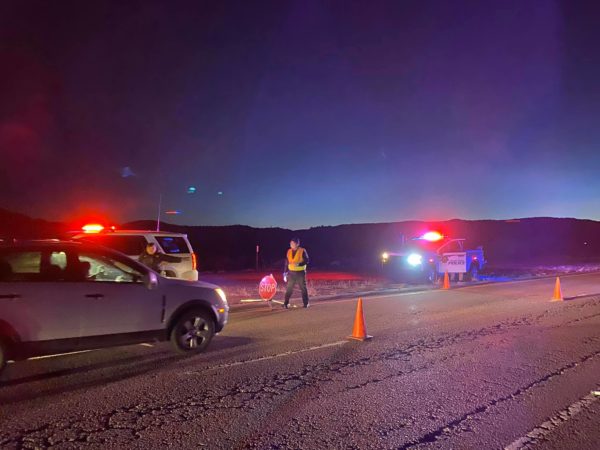
- Details
- By Native News Online Staff
WINDOW ROCK, Ariz. – On Friday, the Navajo Department of Health, in coordination with the Navajo Epidemiology Center and the Navajo Area Indian Health Service, reported 36 new COVID-19 positive cases for the Navajo Nation and two more deaths. The total number of deaths has reached 456 as of Friday. Reports indicate that 6,677 individuals have recovered from COVID-19. 81,131 people have been tested for COVID-19. The total number of COVID-19 positive cases for the Navajo Nation is 9,055.
Navajo Nation COVID-19 positive cases by Service Unit:
- Chinle Service Unit: 2,217
- Crownpoint Service Unit: 758
- Ft. Defiance Service Unit: 656
- Gallup Service Unit: 1,482
- Kayenta Service Unit: 1,251
- Shiprock Service Unit: 1,420
- Tuba City Service Unit: 840
- Winslow Service Unit: 428
* Three residences with COVID-19 positive cases are not specific enough to place them accurately in a Service Unit.
On Friday, the state of Arizona reported 3,212 new cases of COVID-19, while New Mexico reported 216 new cases, and Utah reported 500 new cases.
The Navajo Nation’s 57-hour weekend lockdown took effect on Friday, July 31 at 8:00 p.m. and will last until Monday, Aug. 3 at 5:00 a.m. All businesses will be closed for the duration of the lockdown.
“For over one month, we’ve flattened the curve on a consistent basis. We want to get to a point of having no new cases at all, but the reality is that we probably won’t see that happen until there is a safe and proven vaccine that is available. Until, then, we have to remain diligent and we have to keep holding ourselves and others accountable for staying home as much as possible, wearing a mask, social distancing, washing hands, and avoiding large crowds. It appears that other areas in Arizona, Utah, and New Mexico are gradually flattening, but their daily numbers remain high. The safest place for our people to be is here at home on the Navajo Nation,” said Navajo Nation President Jonathan Nez.
The Nez-Lizer Administration also presented a comprehensive proposal this week to use portions of the Navajo Nation’s CARES Act funds for student relief and to assist schools. The focus of the funds first, is to implement a virtual learning platform at schools, as opposed to in-person classroom instruction. A second focus of the funds, is to provide more safety measures for students, teachers, and all school employees due to the ongoing COVID-19 pandemic.
To Donate to the Navajo Nation
For More Information
For more information including reports, helpful prevention tips, and more resources, please visit the Navajo Department of Health’s COVID-19 website. To contact the main Navajo Health Command Operations Center, please call (928) 871-7014
For up to date information on impact the coronavirus pandemic is having in the United States and around the world, visit the Worldometers website.
For up-to-date information about COVID-19, Native News Online encourages you to go to Indian Health Service’s COVID-19 webpage.
The Nez-Lizer Administration is also working with businesses to setup food donation drop-off sites at grocery stores to allow Navajo Nation residents to contribute non-perishable food items, which will be made available to Navajo people and others living in the Phoenix area as a way to give back to our relatives and friends of the Navajo Nation who graciously donated essential items to the Navajo Nation.
More Stories Like This
Native News Weekly (August 25, 2024): D.C. BriefsDeb Haaland Earns Endorsement From Communications Workers of America Local 7076
University Soccer Standout Leads by Example
Two Native Americans Named to Democratic Congressional Campaign Committee's“Red to Blue” Program
Cheyenne River Youth Project Hosts Young Women’s Winter Camp as Part of Lakota Culture Internship
Help us defend tribal sovereignty.
At Native News Online, our mission is rooted in telling the stories that strengthen sovereignty and uplift Indigenous voices — not just at year’s end, but every single day.
Because of your generosity last year, we were able to keep our reporters on the ground in tribal communities, at national gatherings and in the halls of Congress — covering the issues that matter most to Indian Country: sovereignty, culture, education, health and economic opportunity.
That support sustained us through a tough year in 2025. Now, as we look to the year ahead, we need your help right now to ensure warrior journalism remains strong — reporting that defends tribal sovereignty, amplifies Native truth, and holds power accountable.
 The stakes couldn't be higher. Your support keeps Native voices heard, Native stories told and Native sovereignty defended.
The stakes couldn't be higher. Your support keeps Native voices heard, Native stories told and Native sovereignty defended.
Stand with Warrior Journalism today.
Levi Rickert (Potawatomi), Editor & Publisher

